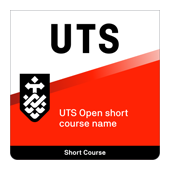Discounts are available for this course as follows:
- 10% discount for UTS staff
- 10% discount for UTS alumni/students
- 15% discount for group enrolments of 3 or more from the same organisation.
Discounts cannot be combined and only one discount can be applied per person per course session. Discounts can only be applied to the full price. Discounts cannot be applied to any offered special price.
How to obtain your discount voucher code (group enrolments)
Please contact the team at support@open.uts.edu.au with details of group enrolments, to obtain your discount voucher code.
How to enrol and obtain your UTS staff discount (UTS staff)
Please contact the team at support@open.uts.edu.au in order to secure your enrolment and 10% staff discount.
How to apply your discount voucher
- If you are eligible for a UTS alumni or student discount, please ensure you have provided your UTS student number during checkout. If you are an alumni and have forgotten your UTS student number, email support@open.uts.edu.au with your full name, UTS degree and year of commencement.
- Add this course to your cart
- Click on "View Cart" (blue shopping trolley at top right of screen). You will need to sign in or sign up to UTS Open
- Enter your eligible code beneath the "Have a voucher code?" prompt and click on the blue "Apply" button
- Verify your voucher code has been successfully applied before clicking on the blue "Checkout" button.














